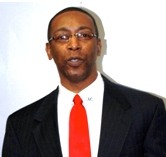Fort Smith Director blasts Civil Service Commission for nixing police chief’s hiring plan
by May 25, 2017 11:54 am 1,358 views

Early this week, the Fort Smith Civil Service Commission (CSC) shot down Fort Smith Police Chief Nathaniel Clark’s request to have the option of hiring sergeant rank or higher positions from outside the department.
Such positions now must be promoted from within, a decision Fort Smith City Director Andre Good emphatically called, “Wrong!” at a Board of Directors study session on Tuesday night (May 23).
“Our Civil Service Commission decided to do what I believe is the job of the chief,” Good said, adding the city hired Clark “to do a job, just like we hired Carl (Geffken, Fort Smith City Administrator) and just like we were elected to do. … How can we bring in diversity if we’re not opening up our application process?”
Good joined with Director Tracy Pennartz in denouncing the lack of diversity in the Fort Smith Police Department, calling it a problem that extends to most every department in city government.
“We have no women in executive staff? Unbelievable,” Good said. “We need to be that leadership we’re asking Chief and Carl to be, and we cannot continue to exist the way things always have. If we are going to continue this conversation and be real about it, we need to let (Clark) do his job even if it means working with the Civil Service Commission or not working with the Civil Service Commission.”
Under questioning from Pennartz, Clark said there were only six female officers and none were ranked sergeant or higher. Additionally, the department employs only three African-Americans, seven Hispanics, and 18 “Asian or Other,” Clark said. The department has 143 sworn officers altogether.

“I think it’s clear to me our department is mostly male and mostly white,” Pennartz said. “That’s not what I want from our police department, and I hope it’s not what our police department wants for our community. When you have young people in high school now who may graduate, unless they can see someone like them in the police department, I don’t know how you attract those individuals.”
Pennartz continued: “I know there are other factors, but if I were a young man or woman of ethnicity, I would say I need to go someplace else because I don’t see anybody like me in the Fort Smith Police Department, and that’s just a fact.”
Clark told the Board it would be possible to achieve diversity without hiring from outside the department for positions, but noted it would take longer (“five years or more”).
“When we start talking about diversity, any Chief should want a department that mirrors the community he provides services to. When I see diversity, I’m looking at education and experience. At the end of the day, I want the best, most qualified applicant to serve the citizens. This is not about me. It’s about the citizens,” Clark said, adding that competition would be “good” for existing officers as well.
He added: “There are some bright and shining stars in the Fort Smith Police Department, and I’m a firm believer this process would bear that out.”
The Civil Service Commission challenge is just one of many issues Clark inherited from a department that witnessed its last chief, Kevin Lindsay, stepping down after using a racially charged statement for which he would later apologize. Most of those issues stem from budget, which has been met with multiple cuts over the years, namely a shortage of sworn personnel.
According to the U.S. Department of Justice (DOJ), a city Fort Smith’s size (population 88,194, according to the latest U.S. Census Bureau estimates) should carry 2.1 officers per 1,000 population. Similarly, the Federal Bureau of Investigation (FBI) notes in its Uniform Crime Report places the number at 2.2 per 1,000. Depending on which set of numbers one subscribes to, Fort Smith’s 143 sworn officers are anywhere from 42-51 short of its current needs – a shortage that would only grow without relief if the city’s 10-year growth rate of 7.4% continues into 2020 and 2030, which project a need for 193 and 207 sworn officers, respectively.
Fort Smith has also lagged behind smaller markets in base annual salary, making it harder to recruit and retain talent, with communities as small as Booneville (population 3,933) paying $37,114 against Fort Smith’s $36,233.
